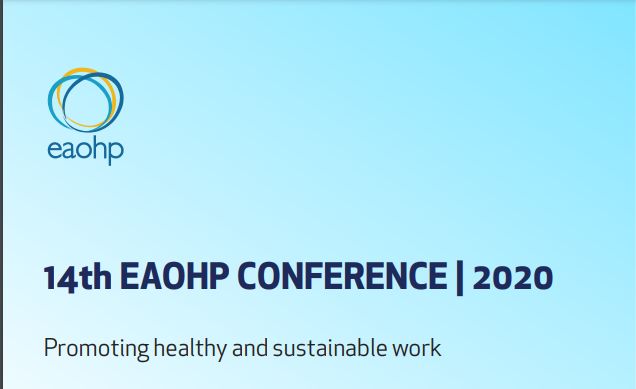14th European Academy of Occupational Health Psychology Conference
 The theme for that year's conference was 'Promoting healthy and sustainable work'. This is more important now than ever as new pressures, health, financial and social, have been generated globally because of the pandemic. In the six months since we found ourselves in lockdown or physically and social distancing, we have witnessed a big impact on the population’s mental health. There are many ways in which the OHP community can help. The conference will address what occupational health researchers and practitioners can do to prevent psychosocial risks but also build sustainable work environments in which people can not only survive but flourish despite adversity.
The theme for that year's conference was 'Promoting healthy and sustainable work'. This is more important now than ever as new pressures, health, financial and social, have been generated globally because of the pandemic. In the six months since we found ourselves in lockdown or physically and social distancing, we have witnessed a big impact on the population’s mental health. There are many ways in which the OHP community can help. The conference will address what occupational health researchers and practitioners can do to prevent psychosocial risks but also build sustainable work environments in which people can not only survive but flourish despite adversity.

Αt each conference, IPD participated with a reasearch paper titled:
Mitigating the effects of work-related stress and work/family life imbalance of female lawyers by coaching.
The abstract as included in the book of proceedings:
P15 Mitigating the effects of work-related stress and work/family life imbalance of female lawyers by coaching Ioannis Anyfantis1 , Eleni Matraki2 1European University Cyprus - CERIDES, Nicosia, Cyprus. 2 Institute of Prevention and Development - IPD, Larissa, Greece
The legal profession as practiced by freelance lawyers, has some integral characteristics that impair both the quality of practice and life for many practitioners. Lawyers, especially females, experience high levels of stress which may undercut their effectiveness and result to family instability. During the last few years, coaching has emerged and promoted as an important construct in the context of work – life balance while previous research have reported fast, sustainable and measurable results. The objective of this study is to determine the effect of coaching on a set of career and emotional outcomes for female lawyers as they tend to face greater organizational, interpersonal, and individual barriers towards balanced personal and professional advancement. Initially, a survey was distributed to thirty female lawyers, to screen career satisfaction, perceived promotional opportunities, perceived stress, perceived wellbeing, job demands, financial status etc. Additionally, semi-structured interviews were conducted, focusing on the sense of wellbeing, sense of life purpose, family and motherhood related demands etc. The target group included 30-55 years old female lawyers, single, married, with or without children, acting as freelance lawyers for more than 4 years. After the screening phase, 5 one-to-one coaching sessions were delivered to each one of them, during a period of two months, focusing on work-life balance. At the end of this period we reconducted the survey to target group, in order to re-measure career and emotional outcomes. Analysis of the results revealed that female lawyers do experience high levels of perceived stress, due to excessive work demands that affect their perception of their work and personal life balance. T-test of mean values for pre and post coaching survey responses identified statistically significant differences for the perceived wellbeing (p=0.038), perceived stress levels (p=0.023). In that terms, target group appeared to significantly benefit from coaching in various aspects of their lives, by redefining their role. Additionally, they reported a feeling of relief, while being self-oriented and more confident to provide competent services appropriate for their clients' needs and at the same time take control of a balanced life.